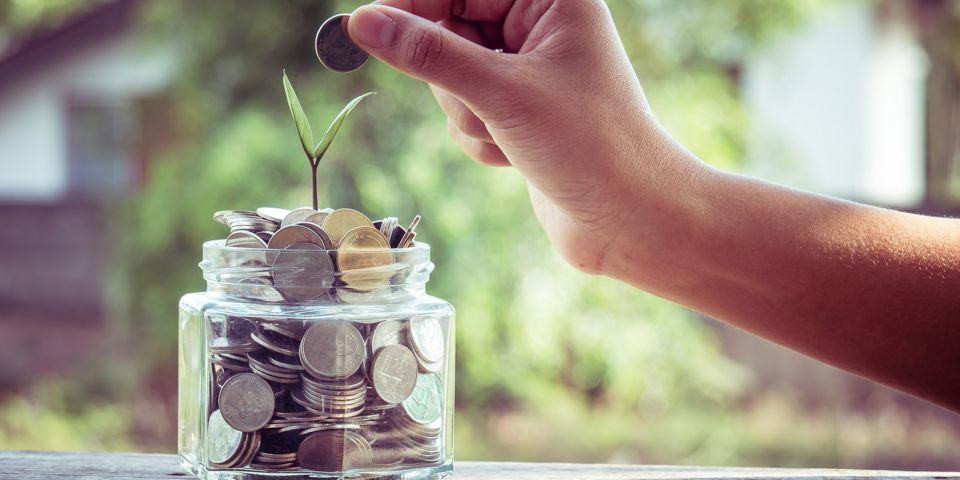During the month of July, #SavingsMonth, we at 1Life asked our social media followers for their best savings tips. We chose the best ideas to share with you - be inspired to make every month Savings Month!
Tricks with coins and notes
Many people said that they use coins – commonly seen as “disposable money” – as a way to trick themselves into saving.
I take all my silver coins and throw them into a savings tin, you will not believe how much money you save that way.
“I take all my silver coins and throw them into a savings tin,” said Mpho. “You will not believe how much money you save that way. You don’t even notice how much money you waste. When I opened my tin at the beginning of December last year, I had R2 500 in it!”
For some, this saving method works so well that they get coins from the bank instead of notes. “I contribute R200 and hubby contributes R200, and we go to the bank and ask for R400 in loose change, then we keep them in our baby’s big formula tin. We don’t want to keep the notes because it’s too easy to use them during the month,” said Thembisile. “In December, we go back to the bank and change all our coins back to notes to buy Christmas gifts for the whole family.”
On the other hand, Natashia said that paying cash helps her to control her spending. “I started drawing cash instead of swiping my card this makes me more aware of my spending. Somehow, using cash makes the spending more real,” she said.
Needs and wants
Learning to distinguish between wants and needs was another tip that came up frequently. “Keep a budget record of your spending. I do mine on an Excel page. It helps identify where money has been wasted, and also to see clearly which were wants or needs,” said Tiyana.
Sheila explains one of her needs, and how she approaches it. “I need a single mattress. Take note: NEED, not want. I went to look around this morning. I will save a small amount each month until I can buy it with cash.”
Plan, budget and make a shopping list
Many of our followers were clear on the importance of getting the basics right. “I compile a budget at the end of every month, and the money that’s left over goes into a savings account that is fixed,” said Roselyn.
Ginna advised making a list before you do your monthly grocery shopping, “and only buy what’s on the list and within your budget.”
And Nompumelelo said that she makes a weekly “money date” to stay on top of her finances. “Commit to sitting down with your money once a week. During this time, update your budget, review your accounts and track your progress against your financial goals. Like any relationship, if you want your financial life to improve, you must spend time with your money.”
Never shop while hungry – and only drink water!
It seems a number of our followers learnt the hard way to never shop on an empty stomach. “When I go shopping I make sure I’ve had a good meal, so I am nice and full,” said Manjoo. “When I enter the store, I'm not hungry so I buy what's on my list and out I go with only the necessary items.”
And Ta had a lot to say about the virtues of drinking water. “Drink more water. Not only does it have great health benefits, it has financial benefits too. Drink a big glass of water before each meal to stay fuller for longer and ultimately eat less. Not only will you save on the food bill, you’ll also feel better after you become properly hydrated. Even better, drinking more water means you will spend less money on beverages like soda, juice and tea.”
Save with your children
Unsurprisingly, a lot of the savings tips we received centred around children. Soraya said that recently, her electricity bill has been sky high. “My kid has a habit of leaving the TV, PlayStation and iPad on while playing on my cell phone. Lights are also constantly on when they don’t need to be. So I am in the process of teaching my family to be wise about electricity usage. The new rule in my home is to switch off all devices and appliances that are not in use.”
Cikizwa showed it’s possible to save, even with very little. “As I am getting a child support grant for my two children, I put R150 aside in the bank every month to use it during December. I also buy stamps from Shoprite for R50 per month to buy a school uniform in January.”
And Nikiwe said she has a plan to start children saving early. “Keep a piggy bank for the kids. Tell them to put money in the piggy bank and you’ll double the amount to teach them about investments and rewards.”
Work the rewards programmes
Rewards programmes were another area that received a lot of attention in Savings Month. Of course, you have to use them to make them work for you. “Get as many loyalty cards as you can and make use of apps like SnapSave, which rewards you for shopping,” said Anisha. “You will save so much money!”
Belinda suggested a blanket approach, using every saving and special offer available to you. “Shop around for specials and buy in bulk, use shopper rewards programmes. Every cent helps,” she says.
Get social about shopping and saving
They say a problem shared is a problem halved. Lots of our followers are halving their savings woes by making it happen with friends or family.
Loveitha said that she and her sister and some friends have a lottery club in which each person contributes R200 a month, and each month one of them has a turn taking the money. “There are 12 of us, so we are saving and collecting R2 400. This helps a lot because we know we have to pay each month and when we collect our turn, we have the money to buy what we need. Last year, I was able to buy a washing machine, cash!”
She and her sister also buy bulk vegetables together and split the costs.
Thembisile agreed that stokvels are a great way of saving money. “My friends and I put away a certain amount of money every month at a bank, then in December we either share it between ourselves or we agree on buying groceries necessary for all the December festivities. That way you don't have to worry about buying groceries for December using your annual savings. You can actually use those savings for January and when everyone has Janu-worries, you are worry free.”
South Africa’s great at saving
When it comes to saving money, it’s clear that many South Africans are committed to the process. We offer a vote of thanks to all our followers who took the time to share their savings tips with us, and hope to see you making cents into Rands and Rands into thousands in the years to come.
Frequently asked questions
Many South Africans use coins, often considered "disposable money," as a savings method. They throw their silver coins into a savings tin, accumulating a substantial amount over time without realizing how much they are saving.
One individual opened their savings tin at the beginning of December and found they had saved R2,500 using the coin savings method.
Some people prefer using coins over notes because it's harder to spend coins impulsively during the month. To save more effectively, they withdraw loose change from the bank and keep it in a designated container, such as a formula tin.
Paying in cash makes people more conscious of their spending, as they physically see the money leaving their hands. This increased awareness helps them avoid unnecessary expenses.
Distinguishing between needs and wants is crucial for budgeting. By keeping a budget record and identifying unnecessary expenses, individuals can focus on prioritizing needs and avoid overspending on wants.
Creating a monthly budget and sticking to it is essential for effective saving. One should list all necessary expenses and allocate leftover money to a fixed savings account. Making a shopping list before grocery shopping helps avoid impulse purchases and unnecessary spending.




